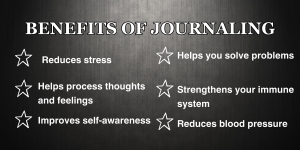Journaling more than a therapeutic activity; it can be a catalyst for growth, self-discovery and lasting recovery success. In addition, it pairs nicely with step work.
The journey to sobriety is a courageous one, filled with challenges and triumphs. The noise in our brain can be triggering. When before, we could quiet that noise with drugs or booze. Now that you’re sober, it’s loud. Finding effective tools to aid the healing process and quiet the noise is essential. Beyond just putting pen to paper, journaling can be a building block for your recovery journey, helping you cultivate new healthy habits and embrace a quiet (and still fun!) life of sobriety.
Here are five compelling reasons why incorporating daily journaling into your early addiction recovery journey is a transformational step towards lasting change.
THE POWER OF DAILY JOURNALING
1. Self-Reflection and Awareness:
Daily journaling encourages introspection, allowing you to explore your thoughts, feelings and triggers. We are accustomed to drink or drug when faced with memories or triggers, seeking to numb them, run from them, and silence them. Journaling gently encourages you to face them by recognizing patterns, trauma, and uncovering hidden emotions. As a result, you gain a deeper understanding of your journey, paving the way for personal growth.
Begin with reflecting on your progress so far. What positive changes have you noticed in yourself since embarking on this recovery journey? How have you handled challenging situations differently?
2. Emotional Release and Healing:
Addiction recovery can stir up a whirlwind of emotions. Journaling provides a safe place to express these feelings, releasing emotional burdens, and facilitating healing.
Write about your emotions without judgment. What emotions have you been experiencing? Are there any specific triggers that you’ve encountered? How can you channel these emotions into productive activities or coping mechanisms?
3. Goal Setting and Progress Tracking:
Journaling allows you to set tangible goals for your recovery journey and track your progress over time. Witnessing your achievements on paper provides motivation and a sense of accomplishment. It is encouraging to look back at what you previously wrote to see the growth you have achieved. Celebrate even the smallest victories!
Define both short-term and long-term goals for your recovery. What steps are you taking each day to work towards these goals? Celebrate even the smallest victories and outline how you plan to stay committed.
CELEBRATE EVEN THE SMALLEST VICTORIES
4. Mindfulness & Mind-Body Connection:
Engaging in daily journaling fosters mindfulness, helping you stay present and connected to your thoughts and actions. This awareness can prevent relapse by enabling you to make conscious choices.
Take a few deep breaths and tune into your body and surroundings. How can you bring this sense of mindfulness into your interactions with others and your daily routine?
5. Strengthening Positive Habits:
Consistently writing in your journal builds discipline and consistency, qualities that are crucial in recovery. Over time, journaling can become a positive habit that supports your overall well-being in sobriety.
Track your progress, share with your sponsor, and celebrate milestones in your journal. Witnessing your commitment will motivate you to continue. It is helpful to have a supportive community to share with.
SHARE WITH YOUR COMMUNITY
There are incredible benefits when it comes to journaling. These benefits are incredibly helpful, especially when in early recovery. Taking time to journal can help reduce stress, help you process your thoughts and feeling, improves your self-awareness, helps you solve problems, strengthens your immune system, and can help reduce blood pressure.

Your journal does not need to be fancy, but finding a useful tool that will encourage you to write is essential. Even a simple spiral-bound notebook. Find something that will work for you.
TIPS FOR GETTING THE MOST OUT OF YOUR JOURNALING
- Find a quiet place so you can relax and be present
- Be uncensored and unfiltered
- Don’t worry about spelling and grammar
- Experiment with different times of day and find what works best
- Consider bringing your journal with you to share with you peer counselor, sponsor, or therapist
There is no need to white-knuckle it in recovery. You need tools and a team. And, in recovery it can be new and unfamiliar to process your feelings. Journaling can help capture your feelings and allow you more grace and time to process those feelings. This will help manage stress and anxiety by quieting the noise and develop a deeper sense of who you are.
Daily journaling isn’t just about putting words on paper; it’s about embarking on a sobriety journey of self-discovery, healing and growth. By incorporating journaling into your early addiction recovery, you’re creating powerful tools that quiets the noise, nurtures healthy habits, fosters mindfulness, and strengthens your resolve for a life of sobriety. Remember, your journal is a space of self-compassion and reflection – a testament to your courage and resilience.
Looking for more inspiration? Be sure to follow us on Instagram and Facebook.

